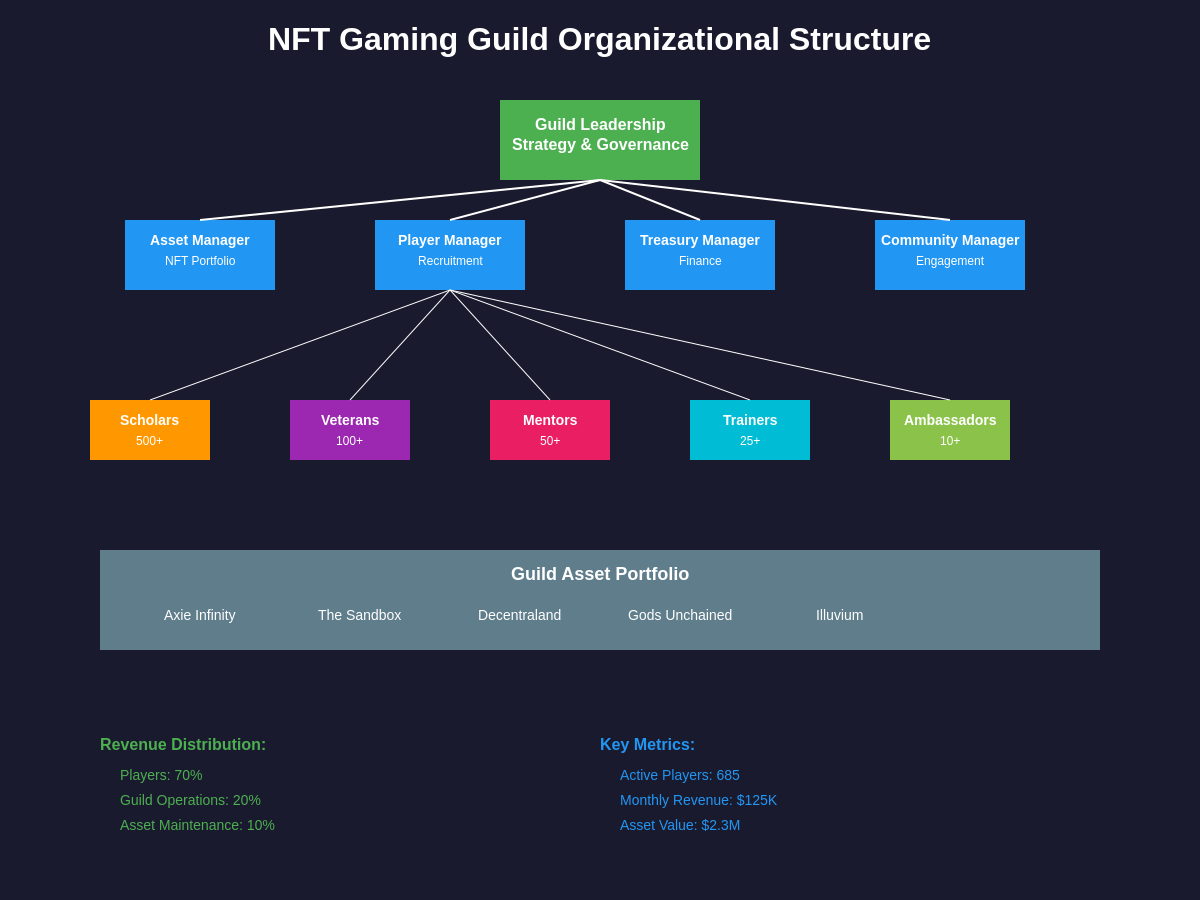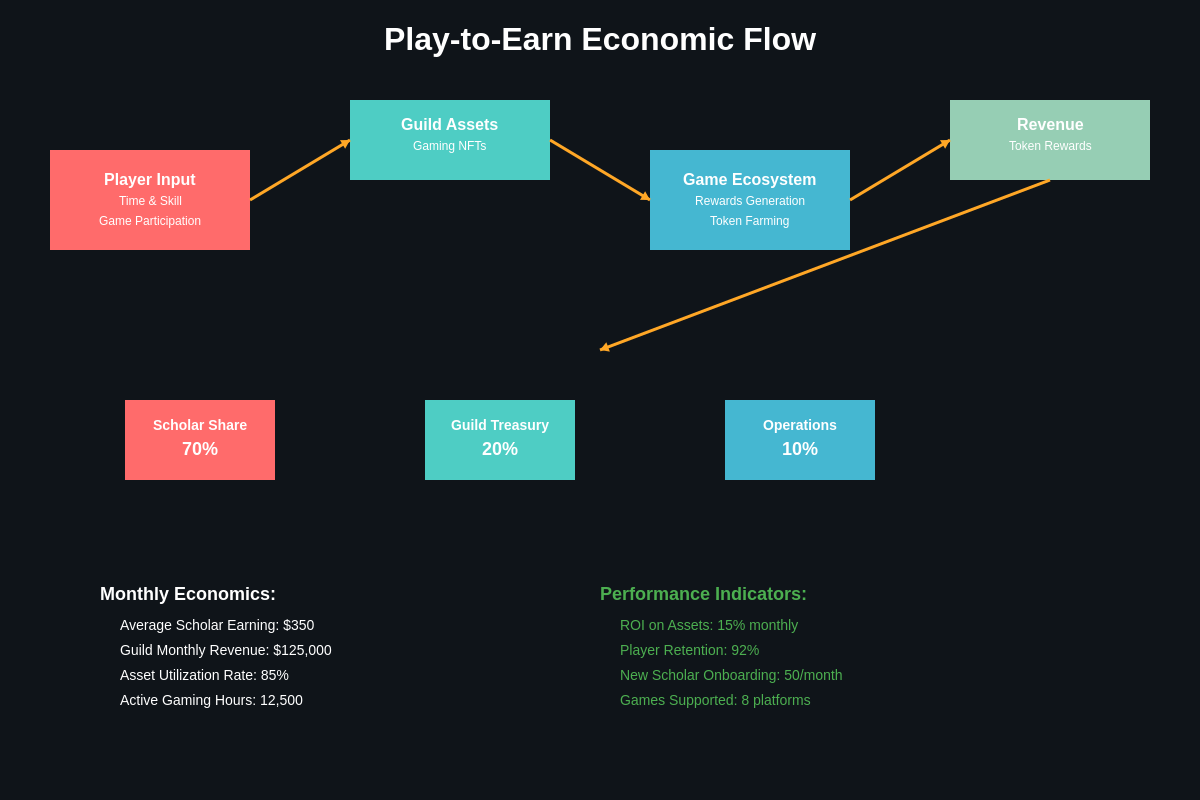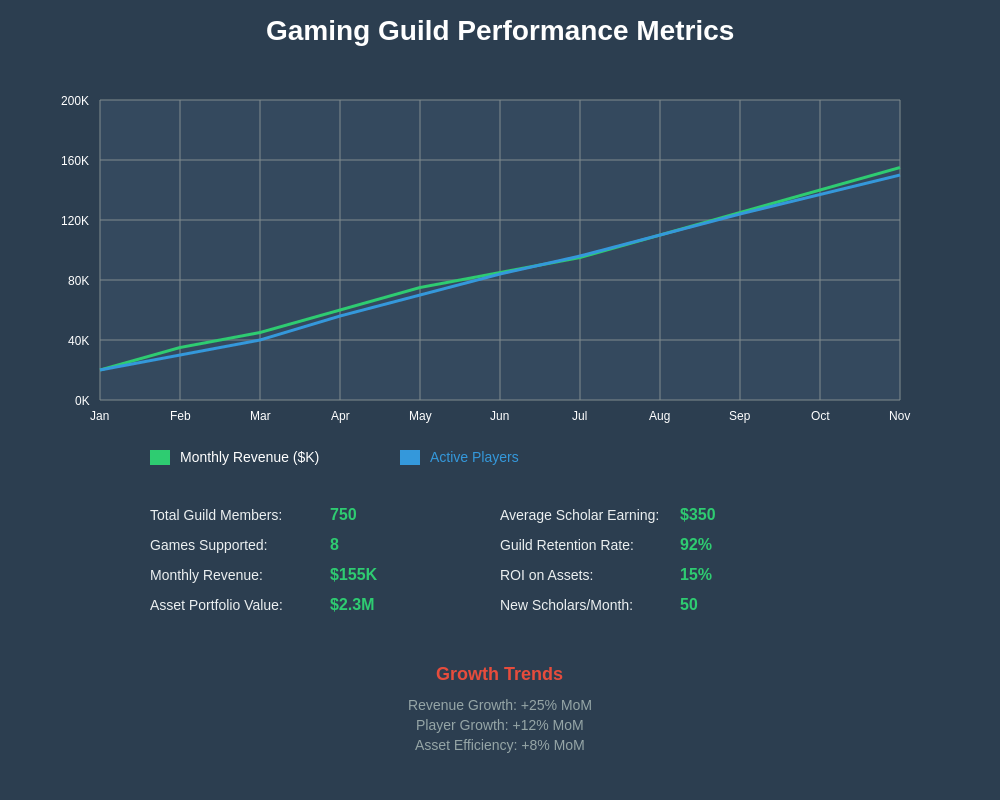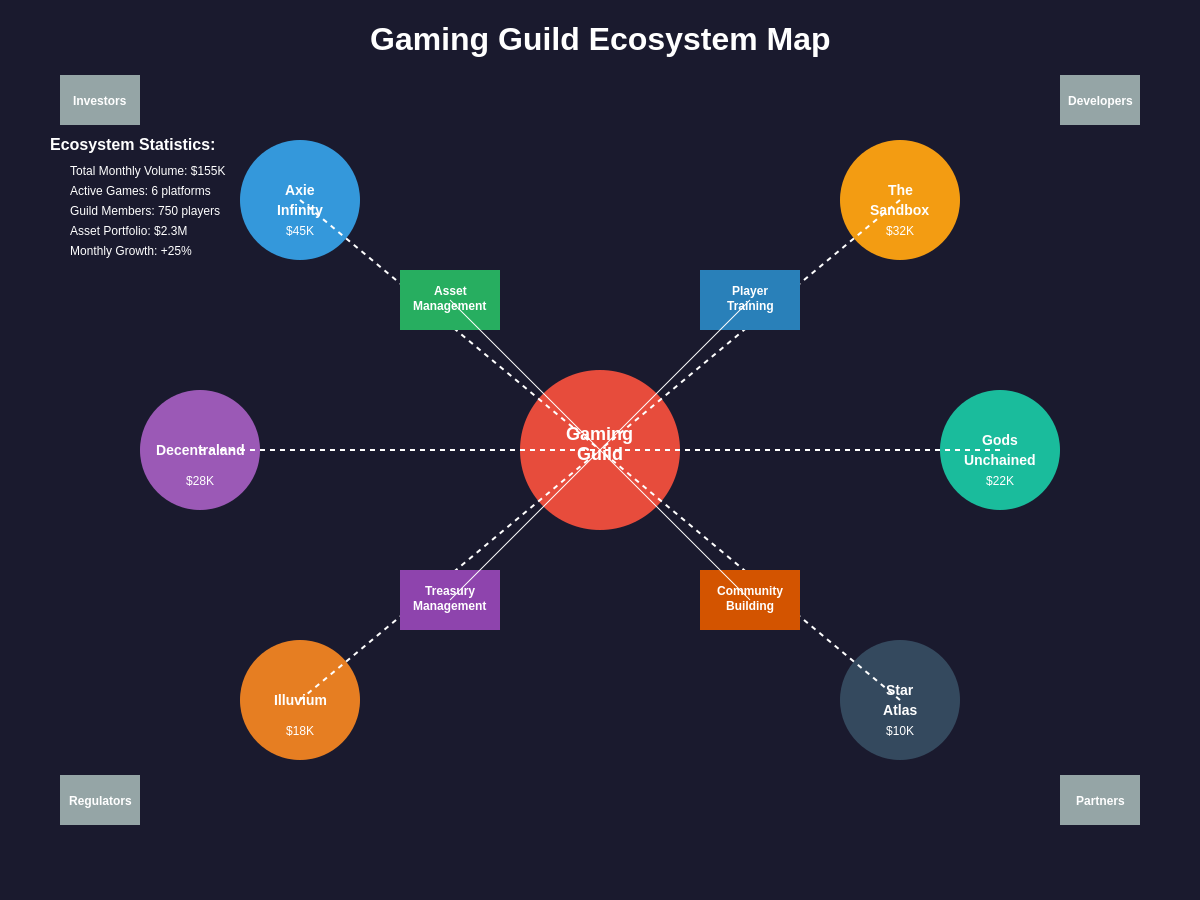The Evolution of Collaborative Gaming Economics
The emergence of NFT gaming guilds represents a fundamental transformation in how players organize, collaborate, and monetize their gaming activities within the rapidly expanding play-to-earn ecosystem. These sophisticated organizational structures have evolved from simple gaming clans into complex economic entities that manage millions of dollars in digital assets while facilitating income opportunities for thousands of players worldwide. NFT gaming guilds have become the cornerstone of the play-to-earn economy, providing essential infrastructure for asset lending, player training, and community coordination that enables participants to maximize their earning potential while contributing to larger economic ecosystems.
Analyze current gaming guild performance data on TradingView to understand market trends and guild token valuations that drive the broader gaming economy.
The sophisticated nature of modern NFT gaming guilds extends far beyond traditional gaming communities, incorporating elements of venture capital, educational institutions, and cooperative organizations to create sustainable economic models that benefit all stakeholders. These guilds have developed intricate systems for asset management, player development, revenue distribution, and community governance that rival those of traditional businesses while maintaining the collaborative spirit that defines gaming culture.
The global scale of NFT gaming guilds has created new forms of economic opportunity that transcend traditional employment models, enabling players from developing economies to earn meaningful income through skilled gameplay while contributing to digital asset economies that generate value for investors and entrepreneurs. This democratization of earning opportunities through gaming has profound implications for global economic inclusion and the future of work in digital environments.
Guild Structure and Governance Models
The organizational structures employed by NFT gaming guilds vary significantly based on their size, focus, and governance philosophy, with different models offering various approaches to decision-making, asset management, and member coordination.
 Traditional hierarchical models feature clear chains of command with guild leaders making strategic decisions about asset allocation, game selection, and community policies, while newer decentralized autonomous organization models enable community members to participate directly in governance through token-based voting systems.
Traditional hierarchical models feature clear chains of command with guild leaders making strategic decisions about asset allocation, game selection, and community policies, while newer decentralized autonomous organization models enable community members to participate directly in governance through token-based voting systems.
Scholarship programs represent one of the most important functions of NFT gaming guilds, providing players who cannot afford expensive gaming NFTs with access to valuable in-game assets in exchange for revenue sharing arrangements that benefit both individual players and guild treasuries. These programs have created sustainable economic models that enable guilds to expand their asset holdings while providing earning opportunities for skilled players who might otherwise be excluded from play-to-earn gaming due to high barrier-to-entry costs.
The governance structures of successful NFT gaming guilds typically incorporate multiple layers of decision-making authority, with different types of decisions requiring different levels of consensus and participation from guild members. Strategic decisions about major asset purchases, game partnerships, and revenue distribution policies often require broad community input, while operational decisions about daily management and player assignments may be delegated to specialized teams or individual leaders.
Revenue sharing models within NFT gaming guilds have evolved to balance the interests of asset owners, active players, and guild operators through sophisticated mathematical formulas that account for factors including asset value, player performance, time investment, and community contribution. These models often incorporate performance incentives that reward high-achieving players with larger revenue shares while maintaining baseline earning opportunities for all participants.
Asset Management and Investment Strategies
The asset management practices of NFT gaming guilds have become increasingly sophisticated as these organizations manage portfolios worth millions of dollars across multiple blockchain networks and gaming ecosystems. Professional guild managers employ diversification strategies that spread risk across different games, asset types, and blockchain platforms while maintaining sufficient liquidity to respond to market opportunities and operational needs.
Gaming asset valuation presents unique challenges for NFT gaming guilds, as the value of in-game NFTs depends on factors including game popularity, asset utility, rarity characteristics, and earning potential that can fluctuate rapidly based on game updates, market conditions, and competitive dynamics. Successful guilds develop internal valuation models that account for these complex factors while maintaining conservative approaches to asset pricing that protect guild treasuries from excessive volatility.
Track gaming NFT market performance to understand asset price movements and identify optimal timing for guild asset acquisitions and disposals.
Investment strategies employed by leading NFT gaming guilds typically focus on acquiring high-utility gaming assets that generate consistent returns through player activity while maintaining exposure to promising new games and emerging gaming platforms. These strategies often involve partnerships with game developers, early access to new gaming NFT drops, and strategic relationships with other guilds that enable coordinated investment activities.
The custody and security of gaming assets represents a critical concern for NFT gaming guilds, with many organizations implementing multi-signature wallet systems, hardware security modules, and sophisticated access control protocols to protect valuable gaming NFT collections from theft, loss, or unauthorized transfer. These security measures must balance protection against threats with operational efficiency that enables quick deployment of assets to active players.
Player Recruitment and Training Programs
The recruitment strategies employed by successful NFT gaming guilds have evolved beyond simple skill assessment to encompass comprehensive evaluation of player dedication, learning capacity, community contribution potential, and long-term alignment with guild objectives. Leading guilds maintain extensive databases of player performance metrics, conduct structured interviews, and implement probationary periods that allow mutual evaluation before committing to long-term scholarship arrangements.
Training programs within NFT gaming guilds have become increasingly sophisticated, incorporating elements of professional coaching, performance analytics, and structured skill development that enable players to maximize their earning potential while contributing to overall guild success. These programs often include mentorship systems that pair experienced players with newcomers, regular performance reviews, and specialized training for different game mechanics and strategies.
The educational components of guild training programs extend beyond game-specific skills to include broader concepts including cryptocurrency fundamentals, DeFi protocols, tax implications of gaming income, and personal financial management that enable players to make informed decisions about their earnings and participation in the broader cryptocurrency ecosystem. This educational focus helps create more knowledgeable and engaged community members who can contribute to guild decision-making and long-term success.
Performance monitoring and optimization within NFT gaming guilds involves sophisticated data analytics that track individual player metrics, team performance indicators, and overall guild efficiency measures that inform decisions about asset allocation, player assignments, and training program effectiveness. These systems often incorporate automated reporting tools that provide real-time feedback to players and managers about performance trends and optimization opportunities.
Economic Models and Revenue Distribution
The economic models underlying NFT gaming guilds have evolved to address complex challenges including fair revenue distribution, sustainable growth funding, operational cost management, and incentive alignment between different stakeholder groups.
 Successful guilds implement transparent revenue sharing formulas that clearly define how earnings are distributed between players, asset owners, and guild operations while maintaining flexibility to adapt to changing market conditions and game economics.
Successful guilds implement transparent revenue sharing formulas that clearly define how earnings are distributed between players, asset owners, and guild operations while maintaining flexibility to adapt to changing market conditions and game economics.
Treasury management represents a critical function for NFT gaming guilds, as these organizations must maintain sufficient reserves to fund operations, expand asset holdings, and weather market downturns while maximizing returns on idle capital through DeFi protocols and strategic investments. Professional treasury managers employ sophisticated cash flow modeling and risk management techniques to optimize guild financial performance while maintaining operational stability.
Monitor DeFi yield opportunities that gaming guilds utilize to generate additional returns on treasury assets while maintaining liquidity for operational needs.
The tax implications of NFT gaming guild operations present complex challenges that vary significantly across different jurisdictions, with guilds requiring specialized accounting and legal expertise to ensure compliance with local regulations while optimizing tax efficiency for guild operations and member earnings. These considerations have become increasingly important as regulatory authorities begin focusing on play-to-earn gaming activities and cryptocurrency income reporting requirements.
Tokenization of guild membership and governance rights has enabled new economic models that allow external investors to participate in guild success while providing existing members with liquidity options and additional incentive alignment mechanisms. These guild tokens often incorporate features including governance rights, revenue sharing, and exclusive access to guild services that create value for token holders while providing guilds with additional funding sources.
Technology Infrastructure and Tools
The technology infrastructure supporting modern NFT gaming guilds incorporates sophisticated software systems that automate many aspects of guild management including asset tracking, player performance monitoring, revenue distribution, and community communication. Custom-built management platforms often integrate with multiple blockchain networks, gaming platforms, and financial services to provide comprehensive operational oversight and decision-making support.
Multi-chain asset management has become essential for NFT gaming guilds as popular games deploy across different blockchain networks, requiring guilds to maintain wallet infrastructure, bridge protocols, and operational procedures that enable seamless asset movement and deployment across various blockchain ecosystems. This multi-chain approach presents both opportunities for diversification and challenges for security and operational complexity.
Analytics and reporting tools utilized by professional NFT gaming guilds provide detailed insights into player performance, asset utilization rates, market trends, and competitive positioning that inform strategic decisions about game selection, asset allocation, and community development. These tools often incorporate machine learning algorithms that identify patterns and optimization opportunities that might not be apparent through manual analysis.
Communication and coordination platforms represent critical infrastructure for distributed NFT gaming guilds, with many organizations maintaining multiple communication channels including Discord servers, Telegram groups, dedicated mobile applications, and custom web portals that facilitate different types of interaction between guild members, managers, and external stakeholders. These platforms must accommodate diverse languages, time zones, and technical skill levels while maintaining security and privacy protections.
Community Building and Social Dynamics
The social dynamics within NFT gaming guilds have evolved to balance competitive gaming performance with collaborative community building, creating environments that foster both individual achievement and collective success. Successful guilds cultivate cultures of mutual support, knowledge sharing, and shared ownership that motivate members to contribute beyond their immediate earning opportunities while building long-term relationships that benefit the entire community.
Cultural considerations play an increasingly important role in NFT gaming guild operations as these organizations expand globally, requiring sensitivity to different languages, time zones, cultural norms, and economic contexts that affect member participation and community dynamics. Leading guilds implement inclusive policies and practices that accommodate diverse backgrounds while maintaining cohesive organizational identity and shared objectives.
Conflict resolution mechanisms within NFT gaming guilds address inevitable disputes about revenue distribution, asset allocation, performance expectations, and community behavior through structured processes that aim to preserve relationships while maintaining fairness and organizational efficiency. These mechanisms often incorporate multiple escalation levels, mediation services, and appeals processes that provide members with confidence in guild governance while protecting guild operations from disruptive conflicts.
The mentorship and knowledge transfer systems implemented by mature NFT gaming guilds create sustainable competitive advantages by developing internal expertise that reduces reliance on external talent while building stronger community bonds between experienced and newer members. These systems often include formal training programs, peer learning groups, and recognition systems that incentivize knowledge sharing and community contribution.
Regulatory Challenges and Compliance
The regulatory landscape surrounding NFT gaming guilds continues evolving as authorities worldwide develop frameworks for addressing play-to-earn gaming, cryptocurrency income, and distributed autonomous organizations that challenge traditional legal and tax categories. Guilds must navigate complex and often conflicting requirements across multiple jurisdictions while maintaining operational flexibility and member privacy protections.
Employment law considerations affect NFT gaming guilds operating in jurisdictions that may classify player relationships as employment rather than independent contractor arrangements, potentially triggering requirements for employment benefits, labor protections, and additional compliance obligations that could significantly impact guild economics and operations. These considerations vary dramatically across different legal systems and continue evolving as courts and regulators address novel economic relationships.
Securities regulation represents another significant compliance challenge for NFT gaming guilds, particularly those that issue governance tokens or investment products that might be classified as securities under various jurisdictional frameworks. Guilds must carefully structure their token offerings and investment arrangements to avoid regulatory violations while maintaining desired economic and governance characteristics.
Anti-money laundering and know-your-customer requirements increasingly affect NFT gaming guilds as financial authorities focus on cryptocurrency transactions and international money transfers that occur through gaming activities. Compliance with these requirements often involves significant operational costs and privacy trade-offs that guilds must balance against regulatory compliance needs and member preferences.
Competitive Landscape and Market Dynamics
The competitive landscape among NFT gaming guilds has intensified significantly as the play-to-earn gaming market has expanded, with established guilds facing competition from new entrants, traditional gaming organizations, and institutional investors seeking exposure to gaming NFT markets.
 This competition has driven innovation in guild services, economic models, and community building while creating challenges for member retention and asset acquisition.
This competition has driven innovation in guild services, economic models, and community building while creating challenges for member retention and asset acquisition.
Market concentration within the NFT gaming guild sector presents both opportunities and risks, with leading guilds accumulating significant market share and economic influence that enables economies of scale and strategic advantages while potentially creating systemic risks if dominant guilds experience operational or financial difficulties. This concentration trend has implications for market competition, innovation incentives, and overall ecosystem resilience.
Analyze gaming token market dynamics to understand competitive positioning and market trends affecting guild investment strategies and asset valuations.
Partnership strategies between NFT gaming guilds and game developers have become increasingly important as competitive advantages, with exclusive partnerships providing preferential access to new gaming content, early asset releases, and development influence that can significantly impact guild success. These partnerships often involve complex negotiations about revenue sharing, marketing collaboration, and strategic alignment that require sophisticated business development capabilities.
The emergence of institutional investment in NFT gaming guilds has brought additional capital and professional management expertise to the sector while potentially changing the culture and objectives of guild operations. Institutional involvement often introduces higher performance expectations, professional governance requirements, and exit strategy considerations that may conflict with community-focused guild traditions.
Future Trends and Market Evolution
Technological developments including improved blockchain scalability, enhanced gaming graphics, virtual reality integration, and artificial intelligence applications are expected to significantly expand the scope and sophistication of play-to-earn gaming while creating new opportunities and challenges for NFT gaming guilds.
 These developments may require substantial technology investments and operational adaptations that will advantage guilds with strong technical capabilities and financial resources.
These developments may require substantial technology investments and operational adaptations that will advantage guilds with strong technical capabilities and financial resources.
The integration of traditional gaming companies into the NFT gaming space represents a significant trend that could reshape competitive dynamics, with established gaming studios leveraging their content creation capabilities, user bases, and technical expertise to compete with blockchain-native gaming projects. This integration may create new partnership opportunities for NFT gaming guilds while potentially commoditizing certain guild services.
Regulatory developments across major jurisdictions will likely provide greater clarity about the legal status of play-to-earn gaming activities, guild operations, and cryptocurrency gaming transactions while potentially imposing new compliance requirements that could significantly impact guild operations and economics. Guilds that proactively address regulatory compliance may gain competitive advantages as the regulatory environment becomes more defined.
The potential for integration between NFT gaming guilds and broader DeFi protocols creates opportunities for enhanced financial services, automated treasury management, and sophisticated economic mechanisms that could significantly expand guild capabilities while introducing new operational complexities and risk factors. These integrations may enable new guild service offerings and revenue streams while requiring additional technical and financial expertise.
The evolution toward more sophisticated virtual worlds and metaverse platforms may create new forms of guild activity that extend beyond traditional gaming into virtual real estate management, virtual business operations, and comprehensive virtual economy participation that could significantly expand the scope and economic impact of NFT gaming guilds while requiring new skills and organizational capabilities.
Conclusion and Strategic Outlook
NFT gaming guilds have established themselves as essential infrastructure within the play-to-earn gaming ecosystem, providing critical services that enable sustainable economic opportunities for players while creating viable business models that attract investment and drive innovation in blockchain gaming. The continued evolution of these organizations will likely determine the long-term success and mainstream adoption of play-to-earn gaming while creating new forms of economic organization that blur traditional boundaries between gaming, work, and investment.
The success of individual NFT gaming guilds will increasingly depend on their ability to adapt to rapidly changing technological, regulatory, and competitive environments while maintaining the community focus and collaborative culture that distinguishes them from traditional business organizations. Guilds that successfully balance professional management with community engagement while maintaining operational efficiency and regulatory compliance are likely to thrive in the evolving play-to-earn ecosystem.
Monitor overall gaming sector performance to understand broader market trends affecting the NFT gaming guild industry and identify strategic opportunities for guild expansion and development.
The broader implications of NFT gaming guilds extend beyond gaming into fundamental questions about the future of work, economic organization, and value creation in digital environments that will likely influence developments across multiple industries and economic sectors. As these organizations mature and scale, they may provide models for new forms of distributed economic cooperation that could transform how people collaborate and generate value in increasingly digital economies.
Disclaimer: This article is for informational purposes only and does not constitute financial, investment, or legal advice. Cryptocurrency gaming and NFT investments involve significant risks including total loss of investment. Gaming guild participation may have tax implications and regulatory considerations that vary by jurisdiction. Readers should conduct their own research and consult with qualified professionals before making any investment or participation decisions. Past performance of gaming assets or guild returns does not guarantee future results. The regulatory environment for play-to-earn gaming and NFT gaming guilds continues to evolve and may significantly impact operations and returns.